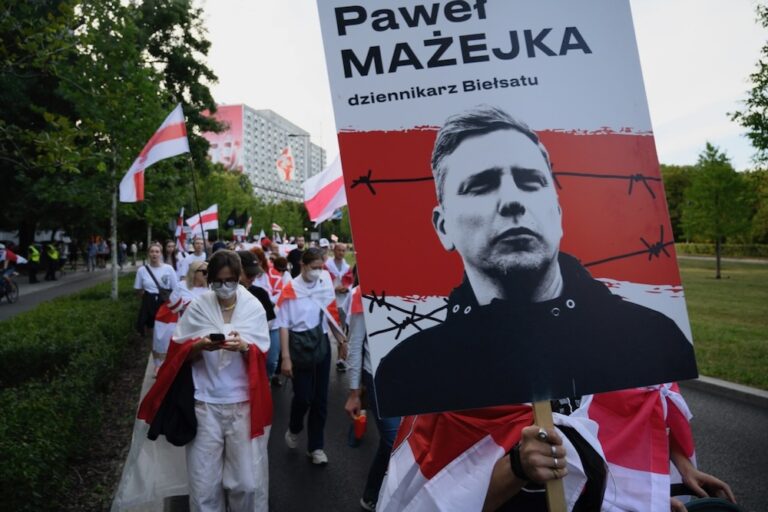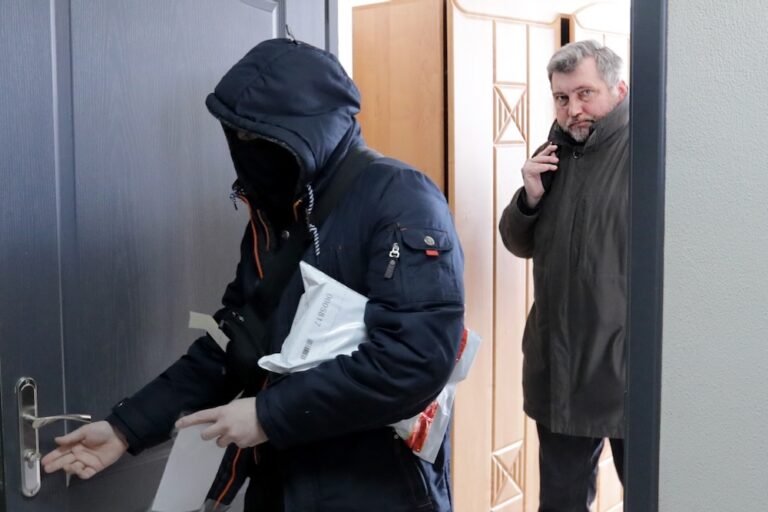Aleksandr Lomashkin was arrested for insulting a customs officer and sentenced to three days in prison; Ales Asiptsu was arrested for for allegedly "urinating in a public place."
(RSF/IFEX) – Reporters Without Borders is outraged by the arrests of journalists Aleksandr Lomashkin and Ales Asiptsu in separate incidents on 24 March 2011, the eve of “Dzen Voly” (Freedom Day), an event that is traditionally celebrated by the Belarusian opposition.
“We regard these arrests as press freedom violations designed to obstruct coverage of opposition activities in Belarus during a period of heightened repression by President Aleksandr Lukashenko’s autocratic government,” Reporters Without Borders said.
A Russian journalist and founder of the human rights website Svoboda, Lomashkin was forced to get off a train from the Russian city of Chelyabinsk at the Belarusian border crossing at Orsh. After being searched by two officers who pretended to be looking for drugs, he was arrested for insulting an officer and was immediately sentenced to three days in prison.
Lomashkin seems to be the latest victim of a government policy to block visitors who could report facts that are embarrassing for the government. Human rights activists Maxim Kitsyuk and Andrei Yurov were expelled on 9 and 17 March respectively.
Asiptsu, a Belarusian journalist who works for several independent media including BelaPAN, was arrested on 24 March near his home in the eastern city of Mahilyow for allegedly “urinating in a public place.”
“The ridiculous grounds given for [these] arrests should not deflect attention from the real motive, which was to prevent these two journalists from covering the discreet celebrations planned by the opposition for [25 March] to mark the 93rd anniversary of Belarus’ first independent and democratic republic. Lomashkin had even gone through the necessary bureaucratic channels to obtain accreditation,” Reporters Without Borders said.
The arrests come three months after a heavy-handed government crackdown in response to the protests that followed the controversial presidential election held on 19 December 2010. Some of the journalists who covered those protests are still being hounded by the authorities.
One of them is Andrey Pachobut, the correspondent of the Polish daily “Gazeta Wyborcza”, who served a 15-day jail sentence after the protests. He was denied press accreditation by the foreign minister at the start of March on the grounds that his reporting was “biased.” As a result, he could now be fined if he tries to work. Then he was prevented from travelling to Poland on 23 March.
A legal battle between the independent newspaper “Narodnaya Volya” and the information ministry is also very important. The newspaper is challenging the warning it received from the ministry for “disseminating information about an organisation that has not obtained legal registration” in a September 2010 article about a campaign by various opposition movements to call for Lukashenko’s resignation.
The ministry objected to the fact that the article quoted Zmitser Dashkevich, the head of the “Molodoy Front” (Youth Front), which the government regards as illegal. “This is an example of censorship of the independent press,” “Narodnaya Volya” editor Iosif Syaredzish said.” If the information ministry wins, it will set an intolerable precedent. The media will no longer be able to quote unauthorised opposition groups. Reporters Without Borders is following the case closely. The next hearing was scheduled for 28 March.


